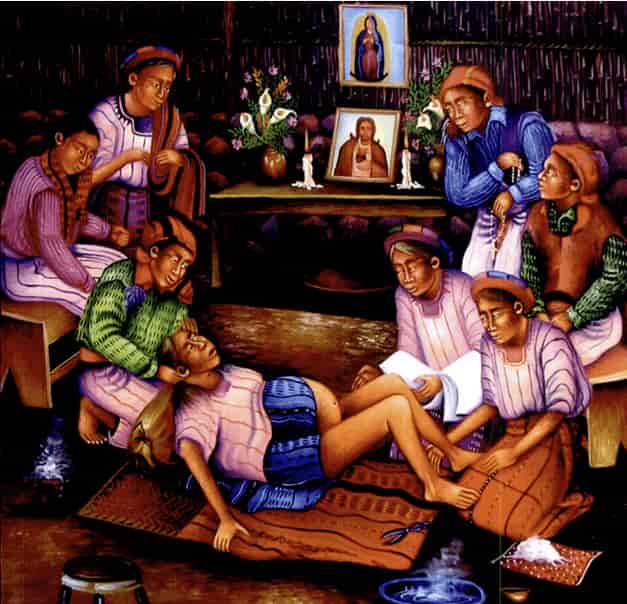Midwifery, the practice of helping women give birth, has been around for thousands of years. The role of a midwife includes monitoring pregnant women for the entire nine months, assisting with delivery, assessing care needs and developing care plans for after the baby is born. Midwifery nurses are an important resource for many women during this exciting and delicate time in their lives! They are known to help women in poverty-stricken communities, as well as those without adequate medical resources.
Founded by an obstetrician, WishGarden Herbs has deep roots in obstetrics with an extensive line of liquid herbal extracts for every reproductive stage. Herbs can be used as an aid for midwives and the general population, or used to soothe and restore balance postpartum.
The history of spiritual midwifery
Historically, many societies have had midwives who were deeply rooted in their culture. Mayan society believed that midwives were responsible for all pregnant women and would continue care into the postpartum stage. Among the Mayans it was believed that their predestined pursuits were presented by God in their dreams. Mayan midwives were believed to have a divine calling and could communicate with the supernatural world. The ancient Egyptians recognized midwifery as a women’s profession in their medical papyrus of herbal knowledge, the Ebers Papyrus. This historic book dates back to 155 BC and has linked obstetrics and herbal medicine for thousands of years!
Midwives did not have their high social status in America at the end of the 19th century. At this time they were believed to be witches or evildoers due to their connection to the use of plant allies in their practice. This was also a time when families began seeking doctors for childbirth assistance and a male-dominated practice emerged. However, it is important to keep in mind that most women did not have access to formal training and education. This combination led to the transition from home births to more births in hospitals.

What does a modern nurse-midwife look like?
To enter the field of contemporary midwifery today, a recognized diploma in midwifery is necessary. The title leads to registration with the Nursing and Midwifery Council and requires high emotional intelligence and patience to support women through all facets of their birth. In 1716, nurse-midwives were required to be licensed in New York State for the first time, but formal training was not reported until 1765. Today, most midwives work in birth centers and women’s clinics.
WishGarden was born out of activism
Catherine Hunziker, the formulator and president of WishGarden Herbs, was deeply involved in the Herbal Renaissance in the early 1970s as an activist for women’s health and women’s rights, and her connection to folk herbalism and obstetrics planted the seeds from which WishGarden sprang. She trained as a nurse-midwife at the Emma Goldman Clinic in Iowa City, where she strengthened women’s health. During an interview, Catherine spoke about how “the feminist movement of the 1960s led us to reclaim our bodies” and “women reclaimed their childbirth experience” in the early 1970s, leading to the rise of legislation on obstetrics. found in the northwest Pacific Ocean and here in Boulder, Colorado. The activism resulted in physicians sponsoring midwives and legalizing midwives to practice in hospitals.
Catherine attended many births and connected obstetrics with folk herbalism as she worked toward childbirth education. She gave birth to her own children and continued the birth movement as an educator. Catherine purchased WishGarden Herbs in 1987 from another midwife and friend. The formulas are made the old-fashioned way, still inspired by folk herbal medicine!
Formulas for women
WishGarden Herb’s liquid herbal extractions are popular with modern midwives because they support a woman’s fertility and health during every stage of pregnancy, up to and after delivery.
Fertility Prep Conception Support is formulated with herbs to support optimal fertility. It is traditionally used during the months leading up to conception.
Morning Sickness Nausea Relief is formulated for pregnancy and made with gentle herbs such as peach leaf to support the liver and quell the discomfort of morning sickness.
Pregnancy can bring many challenges from day to day, so promoting rest and relaxation is paramount. Stress Release Tension Tamer for Pregnancy is perfect for dealing with common stressors, a worried mind or emotional tensions. Passionflower, Milky Oats buds and Lemon Balm combine beautifully to support nervous system health.
AfterEase For After Birth Contractions is another proven combination made with Cramp Bark, Black Haw, Motherwort and Yarrow. It can be used topically or orally to ease contractions and discomfort after birth. Women have reported that this is the only thing they carry from room to room besides their baby!
Milk Rich Supply Booster has been developed for breastfeeding mothers and promotes milk supply.
For more information, please view our maternity line.
Herbal formulas are great tools for healthy childbearing years, but midwives are most important in supporting a woman’s journey through childbirth.
Lauren Ann Nichols-Sheffler attended the Colorado School of Clinical Herbalism and received her certificate in Medical Herbalism. She owns it Blue yarrow herbs also known as Herbal Vice, an herbal product company that practices bioregional herbal medicine by growing plants and sourcing locally. Lauren loves educating and advocating for plant sustainability. She is the purchasing and sourcing manager for WishGarden Herbs.
For educational purposes only. This information has not been evaluated by the Food and Drug Administration. This information is not intended to diagnose, treat, cure, or prevent any disease, or to sell any product.
Read further

